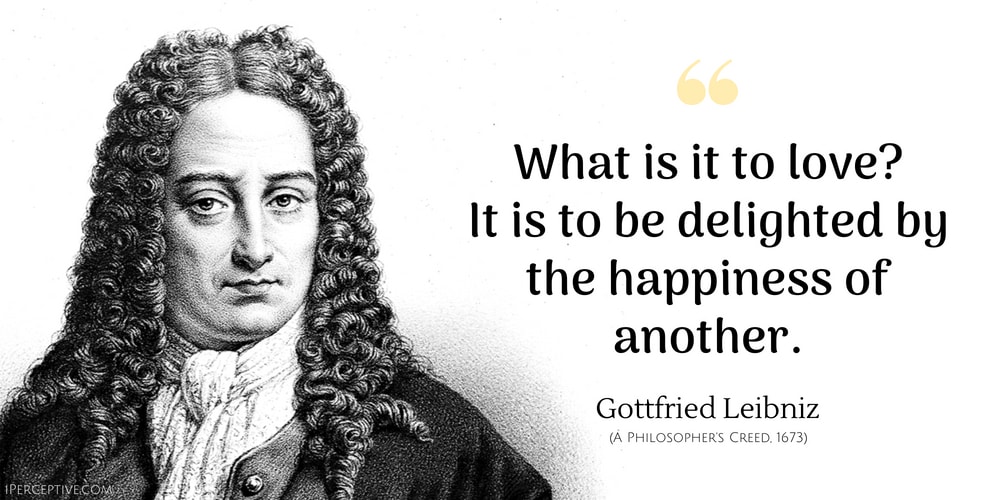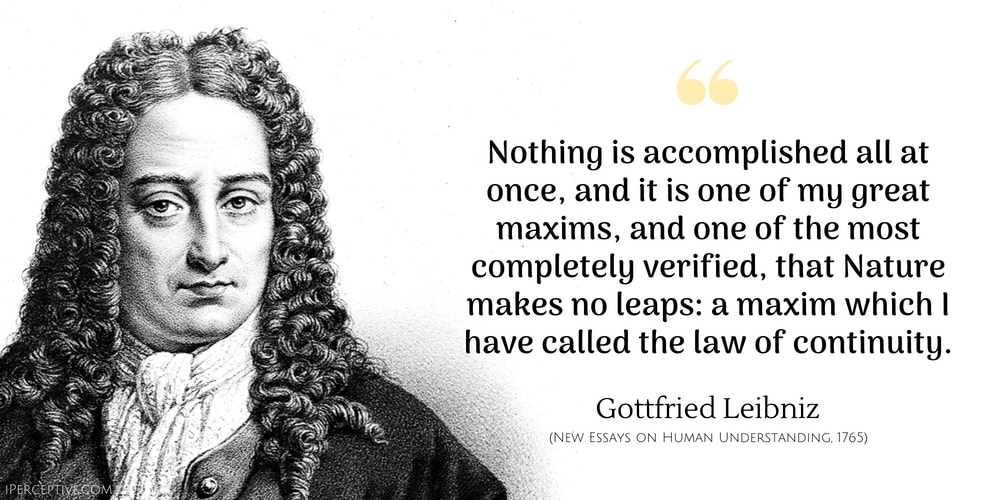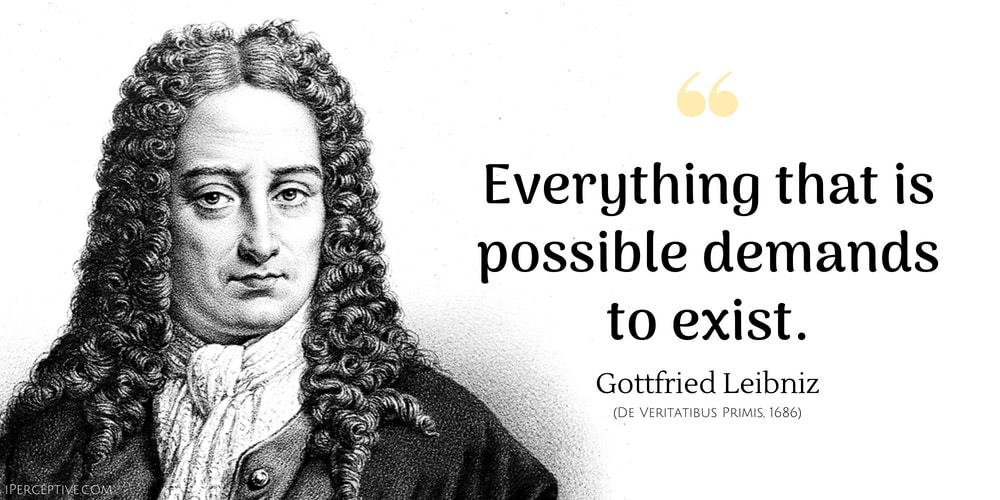Gottfried Leibniz Quotes

What is it to love?
It is to be delighted by the happiness of another.
Music is a hidden arithmetic exercise of the soul, which does not know that it is counting.
Every substance is as a world apart, independent of everything else except God.
Although the whole of this life were said to be nothing but a dream and the physical world nothing but a phantasm, I should call this dream or phantasm real enough, if, using reason well, we were never deceived by it.
And as every present state of a simple substance is naturally a consequence of its preceding state, so its present is pregnant with its future.
There is nothing without a reason.
I am convinced that the unwritten knowledge scattered among men of different callings surpasses in quantity and in importance anything we find in books, and that the greater part of our wealth has yet to be recorded.
Thus it may be said that not only the soul, the mirror of an indestructible universe, is indestructible, but also the animal itself, though its mechanism may often perish in part and take off or put on an organic slough.
Now this connection or adaption of all created things with each, and of each with all the rest, means that each simple substance has relations which express all the others, and that consequently it is a perpetual living mirror of the universe.
Thus our body must be affected to some extent by the changes in all the others.

Nothing is accomplished all at once, and it is one of my great maxims, and one of the most completely verified, that Nature makes no leaps: a maxim which I have called the law of continuity.
I maintain also that substances, whether material or immaterial, cannot be conceived in their bare essence without any activity, activity being of the essence of substance in general.
Moreover, it must be confessed that perception and that which depends upon it are inexplicable on mechanical grounds, that is to say, by means of figures and motions. And supposing there were a machine, so constructed as to think, feel, and have perception, it might be conceived as increased in size, while keeping the same proportions, so that one might go into it as into a mill. That being so, we should, on examining its interior, find only parts which work one upon another, and never anything by which to explain a perception. Thus it is in a simple substance, and not in a compound or in a machine, that perception must be sought for.
There are never in nature two beings, which are precisely alike.

Everything that is possible demands to exist.
Indeed in general I hold that there is nothing truer than happiness, and nothing happier and sweeter than truth.
Nature does not make leaps.
The soul is the mirror of an indestructible universe.
There are two kinds of truths: those of reasoning and those of fact. The truths of reasoning are necessary and their opposite is impossible; the truths of fact are contingent and their opposites are possible.
To love is to be delighted by the happiness of someone, or to experience pleasure upon the happiness of another. I define this as true love.
Now where there are no parts, there neither extension, nor shape, nor divisibility is possible. And these monads are the true atoms of nature and, in a word, the elements of things.
Now this supreme wisdom, united to goodness that is no less infinite, cannot but have chosen the best. For as a lesser evil is a kind of good, even so a lesser good is a kind of evil if it stands in the way of a greater good; and the would be something to correct in the actions of God if it were possible to the better. As in mathematics, when there is no maximum nor minimum, in short nothing distinguished, everything is done equally, or when that is not nothing at all is done: so it may be said likewise in respect of perfect wisdom, which is no less orderly than mathematics, that if there were not the best (optimum) among all possible worlds, God would not have produced any.
But it is the knowledge of necessary and eternal truths which distinguishes us from mere animals, and gives us reason and the sciences, raising us to knowledge of ourselves and God. It is this in us which we call the rational soul or mind.
The ultimate reason of things must lie in a necessary substance, in which the differentiation of the changes only exists eminently as in their source; and this is what we call God.
I have learnt from experience that nothing defeats courage and removes the taste for beautiful things more than the importunate reflections we make on human misery, and on the vanity of our undertakings. It is the sole stumbling block of noble minds, on which it is all the easier to fail the more exhaulted one's genius. For ordinary minds do not pause over this great consideration about the future which in some sort includes the whole universe: but in compensation they are happier, for they taste apparent goods, without its occurring to them to destroy the pleasure by too exact a reflection. And since a happy folly is better than a bitter prudence, I think we should do well to turn deaf ears to reason and give ourselves up to custom, or else to reason for our diversion only, if there be no means of reconciling wisdom with contentment. But, God be praised, we are not so unfortunate, and Nature would be a stepmother, if that which makes our perfection were the cause of our wretchedness.
We should like Nature to go no further; we should like it to be finite, like our mind; but this is to ignore the greatness and majesty of the Author of things.
I was happy to be among men, but not happy about human nature. Often I thought with sorrow of the evils to which we are subjected, of the short duration of our life, the vanity of glory, the inconveniences which spring from pleasure, the illnesses which crush our very spirit; finally the annihilation of all our glories and all our perfections in the moment of death, which seems to reduce to nothing the fruits of our labours. These meditations made me melancholy. I had a natural love of doing good and knowing the truth. Yet it looked as though I were taking pains to no purpose, and as though a fortunate crime were better than a oppressed virtue, and the folly which satisfies preferable to the reason which gives pain. But I resisted these objections, and the better part triumphed in my mind through the consideration of the Divinity, who kept up my hopes by the expectation of a future capable of making up for everything.


